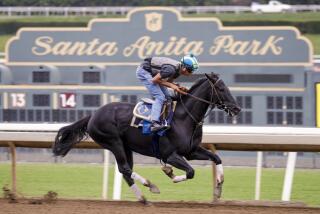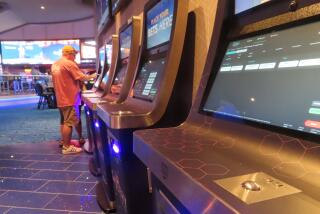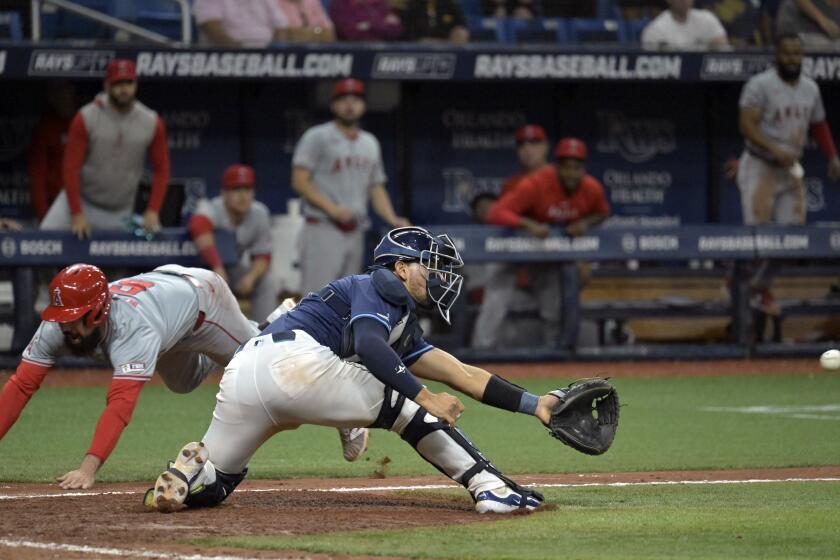Could sports betting boost the action at horse racing tracks?
In a compact room furnished with betting booths and multiple televisions on the clubhouse level at Santa Anita, not every screen is tuned to horse racing.
On one recent afternoon, two TVs showed major league baseball games, another tracked Tiger Woods at a golf tournament and one beamed bowling.
The room, dubbed the Sports Book, is designed to replicate the scene and the vibe of a Las Vegas casino. The only major difference: Patrons cannot plunk down a bet on MLB, PGA or PBA competitions at the track. Only licensed venues in Nevada — plus Delaware, Oregon and Montana on a limited basis— are permitted to accept wagers on those and other events drawing interest from the public.
That might change in the wake of the U.S. Supreme Court’s blockbuster ruling announced Monday that frees up all states to conduct gambling on sports.
Horse racing, in anticipation of the decision, has long envisioned sports betting as a potential stimulus to the struggling industry.
“We would pursue [a sports book] at every one of our racetracks,” said Tim Ritvo, chief operating officer of the Stronach Group, which owns Santa Anita and others.
Architects representing the company already have checked out some of the most expansive sports books at Las Vegas casinos for ideas on hosting similar facilities at its tracks.
With its vast amount of space, Santa Anita could physically accommodate sports betting better than any other prospective site in California. “We have a million square feet,” Ritvo pointed out. Referring to the Vegas sports books, he said, “That’s the kind of rooms we’d want to build.”
The state Legislature and voters will have a say on where sports books could open and how they will operate.
Former state Sen. Roderick Wright sponsored a bill as far back as six years ago — it died — that would restrict sports betting to establishments with existing gambling licenses.
The issue was most recently addressed last summer when Assemblyman Adam Gray (D-Merced) introduced an amendment to the state constitution as a placeholder that ultimately would approve sports wagering should the nationwide prohibition be lifted. The state constitution bans sports betting.
Gray, in a statement released Monday, employed a sports metaphor regarding the Supreme Court’s action.
“The ball is in our court,” he said. “The voters of California will now have to make a decision whether or not to authorize sports wagering.”
Known as Assembly Constitutional Amendment 18, the measure would require approval by two-thirds of the legislature before it winds up on the ballot. It would pass with the backing of a simple majority of voters.
“Whether we like it or not, Californians are already betting on sports through illegal and often unscrupulous websites in foreign countries,” Gray said. “It is time to bring this multibillion-dollar industry out of the shadows.”
California’s casinos and perhaps card rooms can be expected to explore the possibility of sports betting enterprises. They could be pitted against the tracks for a fixed number of licenses.
Josh Rubinstein, president/COO of Del Mar, the state’s second-largest track, voiced guarded optimism that racing facilities might secure a role if sports betting is voted in.
The tribes that operate casinos “hold significant leverage in the state when it comes to gaming legislation,” he said. “The [racing] industry has had a rocky relationship with the tribes but that has improved. The communication between race tracks and tribes is fairly positive on this issue.”
Ritvo counts on Santa Anita being provided the same opportunity as its would-be rivals.
“What we’d want is a level playing field,” said Ritvo, who maintained that accepting bets on racing demonstrates a level of expertise that would serve it well with expanded sports wagering.
“This is a new form of gaming that we should both be entitled to,” he added. “Obviously, we wouldn’t be opposed to the casinos. Hopefully, they wouldn’t be opposed to us.”
Ritvo would not guess whether a sports book at the track would cannibalize or bump up wagering on races. “The question is,” he said, “can you convert it into revenue?”
Yet he expressed no doubt that sports betting could enliven the atmosphere at Santa Anita, which is often sleepy for its weekday programs.
Rubinstein indicated that Del Mar “had internal discussions with industry stakeholders” about including a sports book at the track north of San Diego. “But it’s premature at this time,” he added. “Sports wagering is not what we do. We do horse racing. We would like to partner with someone who does this.”
It is unclear how quickly Santa Anita or other California tracks would introduce sports wagering if they received the legislature’s and voting public’s blessing. The first deadline for government action is Aug. 31, when the current session ends.
“If there is a will, there is a way,” Rubinstein said while acknowledging that movement this year might be too soon.
“It would be a really heavy lift,” he added. “Anything is possible.”
Monmouth Park in New Jersey intends to process its first bets by the end of the month, though it has been poised for years to take the leap. New Jersey is the state that brought the case to the Supreme Court.
If Santa Anita eventually broadens its betting options, the name of the little room with wall-to-wall TVs — Sports Book — would no longer just be wishful thinking.
Correspondent John Cherwa contributed to this report.
More to Read
Get our high school sports newsletter
Prep Rally is devoted to the SoCal high school sports experience, bringing you scores, stories and a behind-the-scenes look at what makes prep sports so popular.
You may occasionally receive promotional content from the Los Angeles Times.






